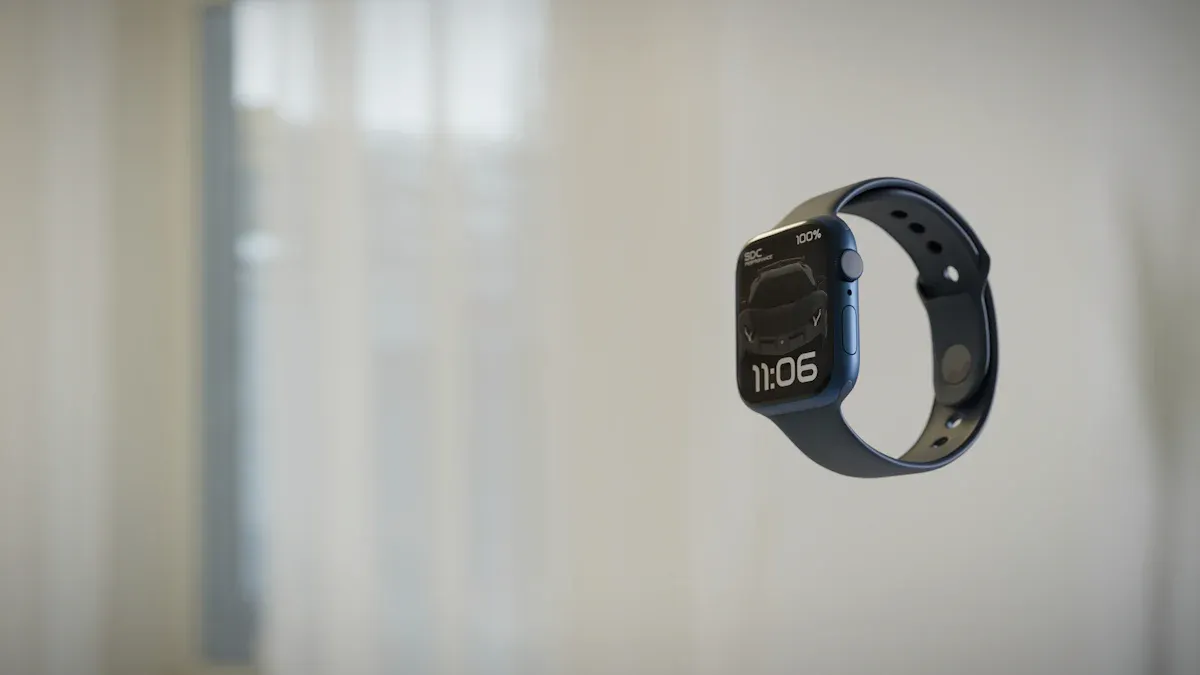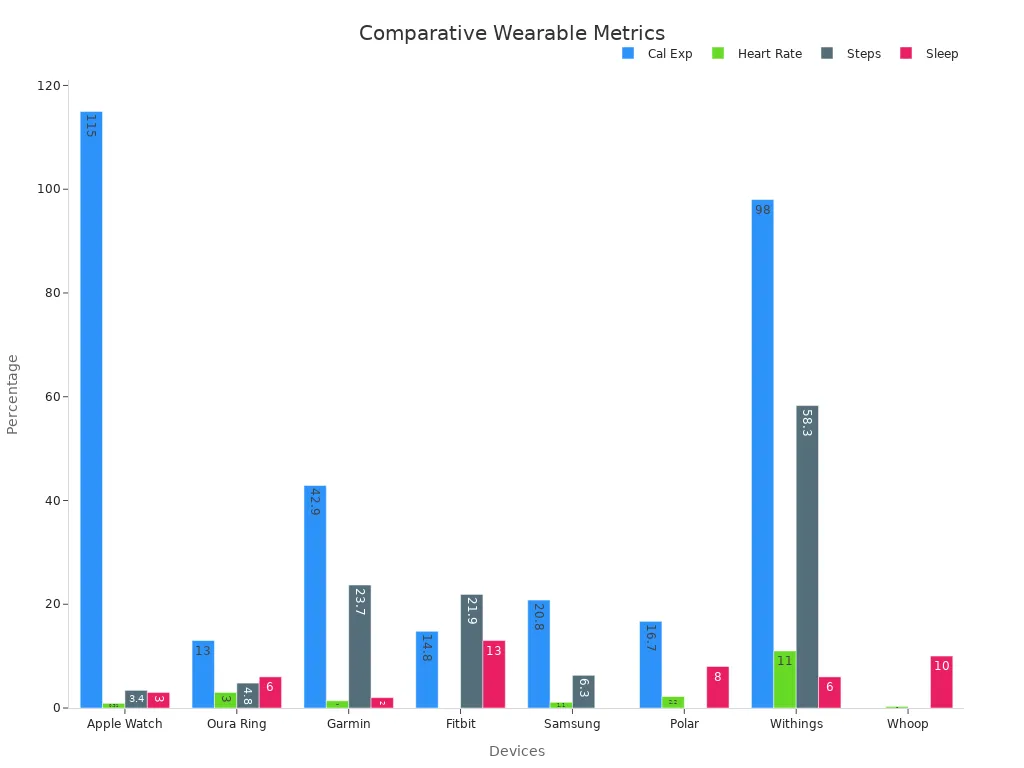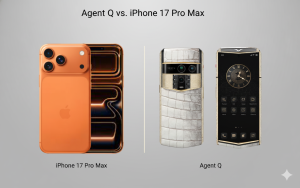
Have you ever thought about why smart rings are popular? These cool gadgets mix high-tech features with a sleek look. They are loved by people who care about their health. The smart ring market is growing fast, projected to go from $2.67 billion in 2023 to $34.87 billion by 2032. But what is a smart ring used for? They track your health and handle notifications. It’s a tiny device with many useful features.
Key Takeaways
-
Smart rings are small and stylish for tracking health, like heart rate and sleep. They are great for everyday use.
-
Their batteries last many days on one charge. This means you can track your health without charging often.
-
Smart rings are good for health tracking but not for detailed activity tracking. They need smartphone apps to work fully.
Advantages of Smart Rings
Discreet and Stylish Design
Smart rings are both useful and fashionable. They are great for any event. Unlike big smartwatches or fitness bands, these rings are small and light. You can wear them to parties, casual hangouts, or even while exercising. They don’t stand out too much. Their simple design matches your style and still offers cool features.
Some rings, like the Vertu AI Diamond Ring, add luxury touches like diamonds. They also have unique designs, making them more than just gadgets. Whether you like classic or modern looks, smart rings come in many styles to fit your taste.
Focused Health Tracking Features
Smart rings are great for tracking health. They check heart rate, blood oxygen, and stress levels. This helps you stay healthy and improve your wellness. For example, the Vertu AI Diamond Ring has a special sensor for checking blood sugar without needles. It makes keeping track of your health easy.
Reports show that more people want smart rings for fitness and health care. These rings are comfy to wear all day, even while sleeping or exercising. This makes them better for long-term health tracking.
Accurate Sleep Tracking
Smart rings can help you learn about your sleep. They use sensors to track light, deep, and REM sleep stages. They also record wake times to show how well you sleep.
Studies found that smart rings like the Oura Ring are about 85% accurate for sleep tracking. They are also good at spotting deep sleep, with a sensitivity of 79.5%. This makes them more reliable than smartwatches or fitness bands. With this info, you can make better choices to improve your sleep and health.
|
Device |
Sleep/Wake Accuracy |
Deep Sleep Sensitivity |
|---|---|---|
|
Oura Ring |
~85% |
79.5% |
|
Apple Watch |
~60% |
50.5% |
|
Fitbit |
~55% |
61.7% |
Long Battery Life and Cost-Effectiveness
Smart rings have batteries that last a long time. Unlike smartwatches that need daily charging, smart rings can go days without charging. For example, the RingConn Gen 2 lasts up to 12 days, and the Oura Ring 4 lasts up to 8 days. You can focus on health tracking without worrying about charging often.
Smart rings are also worth the money. They may cost more at first, but they last long and have great features. You get sleep tracking, heart rate checks, and even contactless payments in a small, stylish ring.
|
Smart Ring |
Price |
Battery Life |
|---|---|---|
|
Oura Ring 4 |
$350 |
Up to 8 days |
|
RingConn Gen 2 |
$300 |
Up to 12 days |
Smart rings are not just tech gadgets. They are tools to improve your life. Their mix of style, features, and usefulness makes them a smart choice for health and convenience.
Disadvantages of Smart Rings
Limited Activity Tracking Capabilities
Smart rings may not work well for tough workouts. They are good at tracking basic health stats like heart rate and sleep. But they often miss details about physical activities. For example:
-
Some users say the RingConn Gen 2 Air struggles with workout tracking.
-
Others report that smart rings can mix up activities. Subway rides might count as walking, and routes may not be recorded.
These devices might also miscount steps or overestimate sleep time. Compared to smartwatches, they are less accurate for activity tracking. If you need detailed fitness data, a smartwatch or fitness band is better.
Dependence on Smartphone Apps
Smart rings need smartphone apps to show and analyze data. Without your phone, the ring's features are very limited. You can't see detailed health info or change settings on the ring itself. This can be annoying if you prefer devices that work alone.
Tip: Before buying a smart ring, check if the app works with your phone. A bad app can make using the ring frustrating.
Data Privacy and Security Concerns
Privacy is important with wearable tech. Smart rings collect personal data like heart rate, sleep, and location. Sadly, this data isn't always safe. Studies show:
-
Risks of private data leaks and unauthorized access.
-
Over 61 million wearable device records were exposed in 2021 due to weak security.
This raises concerns about how your health data might be used. If privacy matters to you, research how the ring's app handles your data before buying.
Durability and Maintenance Issues
Smart rings are made to last but can still get damaged. Daily use can cause scratches, impacts, or water damage. Many rings, like the RingConn Gen 2 Air and Oura Ring 4, are water-resistant up to 100 meters and resist scratches. But their durability may decrease over time.
|
Feature |
RingConn Gen 2 Air |
Oura Ring 4 |
|---|---|---|
|
Water Resistance |
100 meters |
100 meters |
|
Material |
Stainless Steel |
Titanium |
|
Abrasion Resistance |
Yes |
Yes |
|
Impact Resistance |
Yes |
Yes |
To keep your smart ring in good condition:
-
Wear it daily to check its comfort and fit.
-
Keep it away from extreme heat or harsh chemicals.
-
Clean it often to maintain its look and function.
Even with care, smart rings may need more upkeep than regular jewelry or other wearables.
What is a Smart Ring Used For?
Health Tracking and Wellness Monitoring
Smart rings are great for tracking your health. They check your heart rate, sleep, and stress levels. Some advanced rings, like the Vertu AI Diamond Ring, even measure blood sugar without needles. This makes health tracking easier and less painful.
Studies show smart rings, like the Happy Ring, are good at tracking sleep. They use special algorithms to give accurate results. This helps you understand your sleep better than other devices. Research also shows wearable tech boosts mental health awareness by 30%. It can lower anxiety by 25%, proving these devices help your well-being.
If you want to track your health without big gadgets, try a smart ring. It’s small, stylish, and full of features to help you stay healthy.
Notifications and Smart Home Control
Smart rings make handling notifications and smart home devices easy. They send quiet alerts for calls and messages, so you stay connected. You can pick which notifications to see, keeping things simple.
These rings also work with smart home systems. You can lock doors, change lights, or play music with a tap. It’s like having a remote control on your finger. As smart homes grow, smart rings are becoming a handy tool for daily life.
Contactless Payments and Daily Convenience
One cool feature of smart rings is contactless payments. You can pay for things by tapping your ring. No need for cards or phones. This makes shopping faster and easier.
People love the freedom of not carrying wallets. Smart rings make quick payments simple and stress-free. The market for these rings is growing fast, with a 21.8% yearly growth expected from 2024 to 2030. If you like speed and ease, a smart ring is a great choice.
Comparing Smart Rings to Other Wearables

Smart Rings vs. Smartwatches
Smart rings and smartwatches are made for different purposes. Smartwatches act like small phones on your wrist. They track fitness, show notifications, and even run apps. If you’re very active and need constant updates, a smartwatch might suit you better.
Smart rings, however, focus on basic health tracking. They are great for people who want less distraction and more relaxation. Their small size and light weight make them easy to wear all day. They help you check your heart rate, sleep, and stress without too much information.
Tip: If you want fewer distractions and more calm, try a smart ring.
Smart Rings vs. Fitness Bands
Fitness bands are cheaper and compete closely with smart rings. They track steps, calories, and other basic health stats. But they don’t look as nice or feel as comfortable as smart rings. Fitness bands can also feel heavy, especially when sleeping.
Smart rings, like the Vertu AI Diamond Ring, mix style with useful features. They track important health data, like heart rate and blood sugar, while staying stylish. If you care about both looks and function, a smart ring is a better everyday option.
Here’s a simple comparison of how wearables perform:
|
Device |
Heart Rate |
Steps |
Sleep |
|
|---|---|---|---|---|
|
Apple Watch |
115% |
0.91% |
3.4% |
3% |
|
Oura Ring |
13% |
3% |
4.8% |
6% |
|
Fitbit |
14.8% |
N/A |
21.9% |
13% |

Ideal Use Cases for Smart Rings
Smart rings work best in certain situations. They’re perfect for people who care about self-care and want to track health comfortably. If you like relaxing and want less screen time, a smart ring fits well into your life.
They’re also great for those who dislike big, bulky devices. Whether you’re at work, exercising, or at a fancy event, a smart ring looks good and feels natural. They’re ideal for anyone who wants to stay connected to health data without using a screen too much.
If you want a stylish, useful, and comfy way to track health, a smart ring is a great choice.
Smart rings combine style and usefulness, making them great for personal use. They are good at tracking sleep, checking heart rate, and have long-lasting batteries. But they need smartphone apps and might not fit everyone’s taste.
|
Feature |
Pros |
Cons |
|---|---|---|
|
Design |
Small and light, easy to wear all day |
Tiny screen, needs app for more information |
|
Health Tracking |
Tracks sleep and heart rate well |
Limited activity tracking without phone GPS |
|
Battery Life |
Works 5-7 days on one charge |
Some models may not handle heavy use |
|
Data Privacy |
Good brands use encryption to protect your data |
Risk of data leaks or identity theft |
In the end, smart rings are perfect if you like simple designs and focused health features. Think about your habits, sleep needs, and budget to see if they’re a good match for you.
FAQ
What makes smart rings different from other wearables?
Smart rings are smaller, lighter, and more discreet. They focus on health tracking and convenience while offering stylish designs that blend with your daily outfits.
Can you wear a smart ring while swimming?
Yes, most smart rings are water-resistant. For example, the Vertu AI Diamond Ring has a 5ATM rating, making it safe for swimming up to 2 meters deep.
How do smart rings track your health?
Smart rings use advanced sensors to monitor metrics like heart rate, sleep, and stress. Some, like the Vertu AI Diamond Ring, even offer non-invasive blood glucose tracking.








